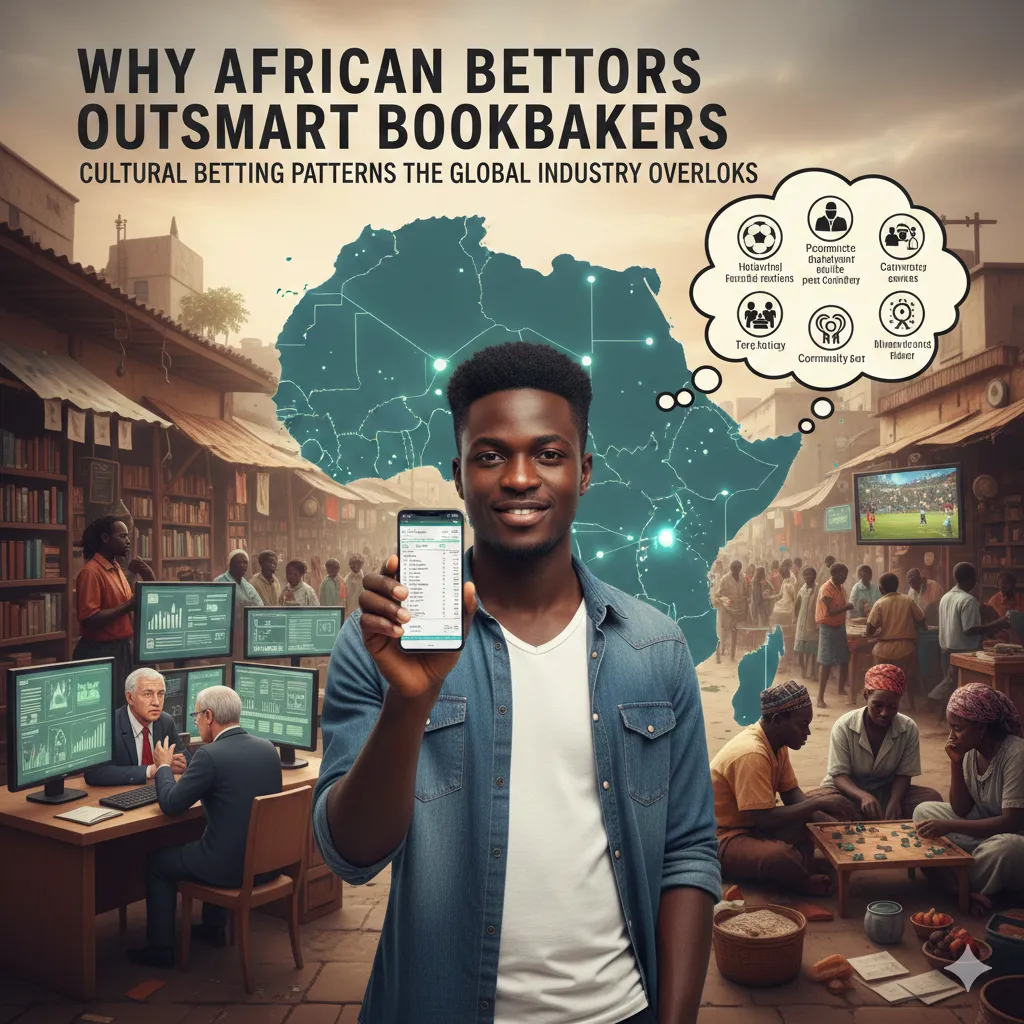How African Startups Are Innovating the Sports Betting Industry
Africa’s sports betting landscape is undergoing a profound transformation driven not by international corporations but increasingly by homegrown startups that intimately understand local markets, technological constraints, and consumer preferences. These innovative companies are reimagining the betting experience through distinctly African solutions that address unique continental challenges while creating entirely new approaches that sometimes leapfrog developments in more established markets. From Lagos to Nairobi, Cape Town to Accra, entrepreneurial teams are developing platforms that go beyond simply adapting existing betting models to create truly original approaches optimized for African contexts. These innovations span technological adaptations that function effectively despite connectivity limitations, payment solutions that overcome traditional banking barriers, community-oriented features that reflect African social structures, and data analytics implementations that transform how odds are calculated and risk is managed across diverse sporting events. The resulting ecosystem demonstrates remarkable creativity in solving complex problems while building sustainable businesses that increasingly compete effectively against much larger international operators. As mobile technology continues its rapid penetration across the continent and regulatory frameworks evolve to support innovation, these African startups are positioning themselves not merely as local alternatives but as potential global innovators developing solutions with relevance far beyond African markets.
The Rise of Homegrown Betting Platforms in Africa
The emergence of African-founded betting platforms represents a significant evolution in a market previously dominated by international operators. These homegrown companies bring unique advantages through their deep understanding of local conditions, consumer preferences, and operational realities that global companies often struggle to fully comprehend or effectively address.
From International Domination to Local Champions
The African betting landscape has undergone remarkable transformation from its initial development phase dominated by European and Asian operators to the current environment where locally-founded platforms increasingly capture market share and drive innovation. This evolution follows a recognizable pattern across major African gambling markets—initial market development led by international companies with established technologies and operational experience, followed by the emergence of local imitators, and finally the development of truly distinctive African platforms built specifically for continental conditions rather than adapted from external models. Nigeria exemplifies this transition, with early market development driven by international brands like Bet365 and Betway before locally-founded platforms including BetKing (founded 2018) and NairaBet (founded 2009) established significant market positions through innovations specifically addressing Nigerian customer needs. Kenya’s evolution shows similar patterns, with SportPesa (founded 2014) pioneering locally-developed solutions before Odibets, Betika, and other Kenyan startups further refined African-centric approaches. The competitive advantages these local companies leverage include deeper understanding of regional sports preferences beyond European football, more effective navigation of complex regulatory environments, stronger cultural alignment in marketing and customer engagement, and more responsive adaptation to local technological and economic realities. This transition toward local leadership has accelerated as African technical talent developed deeper expertise in platform development, payment integration, and betting-specific technologies, reducing reliance on imported systems and enabling truly ground-up innovation rather than adaptation of existing models.
Entrepreneurial Origins and Founding Stories
The founding narratives behind Africa’s betting startups reveal distinctive entrepreneurial patterns that differ significantly from typical gambling industry development in more established markets. Unlike European and American gambling companies often emerging from established gaming corporations or casino operations, African betting startups frequently originate from diverse entrepreneurial backgrounds including telecommunications, financial technology, digital media, and e-commerce. This cross-sector experience brings valuable perspective enabling innovation beyond traditional industry assumptions. Several distinctive founding patterns emerge across the ecosystem: technology professionals identifying gambling-specific problems they’re uniquely positioned to solve, as exemplified by NairaBet founder Akin Alabi, who leveraged his digital marketing expertise to create one of Nigeria’s pioneer online platforms; sports enthusiasts seeking to enhance fan engagement through wagering components, such as SportPesa’s founding team combining sports journalism and technology backgrounds; and fintech entrepreneurs recognizing betting as high-volume transaction environment ideal for deploying payment innovations, as demonstrated by several Kenyan betting platforms with founding teams from mobile money backgrounds. These diverse origins contribute to more innovative approaches than typically emerge from traditional gambling industry participants. Funding patterns similarly demonstrate distinctive characteristics, with many successful African betting startups bootstrapping their initial development rather than raising substantial venture capital, enabling more patient growth trajectories and greater independence in pursuing market-specific strategies rather than applying standardized expansion models preferred by international investors seeking quick returns. This entrepreneurial diversity and independence has fostered more experimental approaches addressing specific African challenges rather than replicating established models from mature gambling markets.
Competitive Advantages Through Local Understanding
The success of Africa’s homegrown betting platforms stems largely from their superior understanding of local market nuances that international operators frequently misinterpret or inadequately address. This local knowledge creates competitive advantages across multiple dimensions including cultural alignment, operational execution, and customer experience design. Language localization represents one crucial advantage, with African startups developing platforms supporting multiple local languages beyond colonial languages like English, French and Portuguese—BetBonanza in Nigeria offers interfaces in Hausa, Igbo and Yoruba alongside English, while Kenyan operators frequently integrate Swahili options, creating more accessible experiences for users more comfortable in local languages. Sports focus demonstrates another key differentiation, with African operators dedicating significantly more attention to regionally popular competitions like the Nigeria Professional Football League, Kenya Premier League, and CAF tournaments compared to international platforms predominantly focused on European content. Payment understanding creates perhaps the most significant operational advantage, with local operators demonstrating sophisticated integration with regional financial systems including mobile money platforms, agency banking networks, and cash collection systems that address the practical realities of markets with limited traditional banking penetration. Customer service approaches similarly reflect deeper cultural understanding, with local platforms typically offering more comprehensive support through channels aligned with regional preferences—including physical agent networks, WhatsApp support, and USSD-based assistance systems rarely prioritized by international operators. These multidimensional local advantages collectively enable African startups to create more relevant, accessible, and effective betting experiences specifically optimized for the markets they serve rather than applying standardized global approaches that often fit African contexts poorly.
Mobile-First Solutions Addressing Unique African Challenges
African betting startups have distinguished themselves through innovative approaches specifically designed for the continent’s unique mobile technology environment. These solutions address distinctive challenges including connectivity limitations, device constraints, and usage patterns that differ significantly from more developed markets where stable broadband and high-end smartphones can be assumed.
Optimizing for Low-Bandwidth Environments
The connectivity reality across much of Africa—characterized by inconsistent coverage, expensive data, and variable speeds—has compelled betting startups to develop remarkably efficient platforms that deliver functional experiences even under challenging network conditions. These optimization approaches extend beyond simple website compression to include fundamental architectural decisions that minimize data requirements while maintaining essential functionality. Several technical strategies demonstrate particular effectiveness: progressive loading implementations that prioritize bet placement interfaces before loading supplementary content, ensuring core functionality remains accessible even when connections deteriorate; selective media compression techniques that reduce image and graphic sizes by 70-80% compared to standard betting platforms while maintaining visual clarity on smaller screens; and intelligent caching systems that store previously accessed data locally, minimizing redundant downloads when users return to previously visited sections. Nigeria’s BetKing pioneered particularly effective approaches through their “lite mode” option that reduces data consumption by approximately 85% while maintaining core betting capabilities, addressing the reality that many customers pay for mobile data in small increments and carefully monitor usage. Kenya’s Odibets implemented innovative offline functionality allowing users to prepare betslips during disconnected periods that automatically process when connectivity resumes, addressing the frequent connection interruptions experienced in many areas. These bandwidth optimizations deliver tangible user benefits—typical African-developed platforms require 70-80% less data transfer per session compared to international betting sites, with leading local platforms consuming less than 1MB for complete bet placement processes compared to 5-7MB for non-optimized alternatives. Beyond customer benefit, these efficiency innovations create significant competitive advantages through expanded market reach to users in areas with marginal connectivity where data-intensive platforms cannot function effectively.
USSD and SMS Betting Solutions
Perhaps the most distinctive African betting innovation involves developing functional wagering experiences entirely outside smartphone applications through USSD (Unstructured Supplementary Service Data) and SMS channels that enable participation via basic feature phones. These solutions acknowledge the reality that while smartphone adoption continues growing rapidly, approximately 40-50% of potential customers across major African markets still use basic devices without app capabilities or have smartphones with extremely limited data access. USSD betting implementations create remarkably effective experiences despite severe technical constraints—using simple numeric menu systems accessible by dialing service codes like *330#, allowing users to navigate sports selections, view simplified odds, and place bets through sequential text menus without requiring any internet connectivity. Kenya’s Betika pioneered particularly sophisticated USSD implementations supporting complete account management, multiple betting markets, and even simplified live betting functions through this channel. SMS betting solutions complement these capabilities through text message commands that allow bet placement using standardized formats, with confirmation messages providing transaction verification. These non-smartphone channels demonstrate substantial adoption despite their limitations—industry data indicates approximately 15-20% of total betting volume across major East African markets still occurs through USSD and SMS rather than apps or websites, with higher percentages in rural areas and among older demographics. The business impact extends beyond simple market expansion, as these channels typically show lower customer acquisition costs and reduced platform development expenses compared to maintaining sophisticated smartphone applications. The resulting inclusive approach ensures betting platforms remain accessible across diverse device environments rather than limiting participation to customers with newer technology, creating both social inclusion and business growth simultaneously.
Progressive App Architectures
African betting startups have emerged as pioneers in developing progressive web application (PWA) architectures that bridge the gap between lightweight web experiences and full native applications, creating ideal solutions for markets with diverse device capabilities and connectivity challenges. These PWA implementations deliver several crucial advantages: they function effectively across both entry-level and premium smartphones; they require minimal initial download compared to native apps (typically 1-3MB versus 20-30MB); they update automatically without requiring user-initiated downloads; and they can function partially offline during connectivity interruptions through sophisticated caching. Uganda’s BetLion demonstrates particularly effective implementation, with their PWA requiring initial download of just 1.8MB while still providing comprehensive betting functionality including live markets, account management, and transaction processing. These architectures solve specific African challenges around app distribution—many users face storage constraints on lower-end devices that prevent installing multiple applications, data limitations that make large app downloads prohibitively expensive, and connectivity challenges that interrupt traditional app installation processes. The user experience benefits significantly from this approach, with research indicating PWA implementations by African betting startups typically load 3-4 times faster than equivalent native applications when tested on entry-level smartphones common across the continent. Beyond performance advantages, these architectures create significant business benefits through development efficiency—unified codebases serving both web and app users reduce maintenance complexity compared to supporting separate platforms, allowing smaller technical teams to maintain competitive offerings without the extensive development resources of international competitors. These PWA innovations represent African solutions with global relevance, as many developed markets increasingly recognize the advantages of this architecture for various application categories, positioning African betting startups among the most experienced implementers of this approach with potential knowledge transfer to other industries and regions.
Payment Innovation and Financial Inclusion
African betting startups have demonstrated remarkable innovation in developing payment solutions that address the continent’s unique financial landscape, characterized by limited traditional banking penetration but rapidly evolving alternative financial systems. These payment innovations extend far beyond simple transaction processing to create comprehensive financial ecosystems that simultaneously solve business challenges and advance broader financial inclusion objectives.
- Mobile money integration represents the foundation of African betting payment innovation, with startups developing sophisticated implementations that go beyond basic transfers to include features like automated account reconciliation, partial payment processing, and dedicated betting wallets within mobile money systems.
- Agent networks establish physical transaction points where customers can deposit and withdraw funds through human intermediaries, effectively creating distributed banking infrastructure in areas lacking traditional financial services, with Nigerian operators maintaining networks exceeding 100,000 agents nationwide.
- Micropayment optimization enables efficient processing of extremely small transactions—often equivalent to just $0.50-1.00—through batching techniques, fee structures, and settlement mechanisms specifically designed for high-volume, low-value transfers that would be economically impractical in traditional payment systems.
- Voucher systems provide cash-based digital loading mechanisms where users purchase pre-paid betting credits through retail networks without requiring bank accounts or mobile money registration, creating entry points for completely unbanked customers.
- Cross-border payment solutions address the challenges of operating across multiple African countries with different currencies and financial regulations, enabling unified platforms to serve regional markets through specialized compliance frameworks and currency management systems.
The development of dedicated betting wallets represents a particularly significant innovation by African startups that extends beyond simple payment processing to create comprehensive financial management systems specifically optimized for wagering activities. These specialized wallet implementations offer several crucial advantages over general-purpose payment methods: they enable immediate fund availability for betting without transaction delays common in traditional banking systems; they create appropriate separation between gambling funds and general finances, supporting responsible management; they facilitate specialized features like partial cashout and bet insurance impossible through standard payment channels; and they enable loyalty mechanisms specifically tied to wallet activity rather than just betting outcomes. Kenya’s Betika pioneered particularly advanced wallet functionality through their “Betika Wallet” system that functions as semi-autonomous financial instrument allowing transfers to external accounts, bill payments, and even limited interest-earning capabilities on unused balances. Nigeria’s BetKing similarly developed sophisticated wallet functionality supporting split transactions, automated recurring deposits, and specialized budgeting tools helping users manage betting expenditure separately from other financial activities. These wallet innovations deliver significant business benefits through reduced payment processing costs, improved transaction completion rates, and enhanced customer retention as funds remain within the platform ecosystem rather than requiring repeated deposits. The broader financial inclusion impact extends beyond betting itself—research indicates approximately 15-20% of users across major African markets report their betting wallet represents their first formal financial service, creating potential pathway toward wider financial system participation through this initial engagement point, though this inclusion benefit must be balanced against responsible gambling considerations to ensure positive rather than harmful financial effects.
The innovative credit and installment systems developed by several African betting startups represent more controversial payment innovations that demonstrate technical creativity while raising important responsible gambling questions requiring careful analysis. These systems address the reality that many potential customers face irregular income patterns that create misalignment between when funds become available and when desired betting opportunities occur. Several approaches have emerged across different markets: Nigeria’s AccessBet developed a “Bet Now, Pay Later” system allowing qualified users to place wagers against future deposits, effectively providing short-term credit for betting activities; South Africa’s Hollywoodbets implemented a specialized installment system where larger deposits can be funded through structured payment plans rather than single transactions; and Kenya’s Betlion created a “Salary Advance” feature allowing users with demonstrated regular income patterns to access portion of anticipated earnings specifically for platform usage. These credit innovations demonstrate technical sophistication through specialized risk assessment algorithms examining previous transaction patterns, platform usage history, and deposit consistency to determine eligibility and limits rather than traditional credit scoring unavailable for many African consumers. While creating potential business advantages through increased participation and higher average transaction values, these credit systems simultaneously raise significant responsible gambling concerns regarding potential overspending and problematic behavior encouragement. Progressive operators have implemented important safeguards including mandatory cooling-off periods between credit usage, strict eligibility requirements including previous responsible platform behavior, absolute caps on credit availability regardless of user history, and integration with self-exclusion systems preventing credit access for customers demonstrating problematic patterns. These balanced approaches acknowledge both the legitimate need for financial flexibility in irregular income environments and the ethical responsibility to prevent exploitation of vulnerable customers, demonstrating how innovation can address genuine market needs while incorporating appropriate protective frameworks.
Data Analytics and Artificial Intelligence Applications
African betting startups have increasingly leveraged sophisticated data analytics and artificial intelligence capabilities to create competitive advantages through enhanced risk management, customer experience personalization, and operational efficiency. These technological implementations address specific African market challenges while creating innovative approaches with potential application beyond the continent.
Localized Odds Calculation and Risk Management
One of the most significant innovations by African betting startups involves developing specialized odds calculation systems optimized for the unique characteristics of local sporting events that lack the comprehensive historical data and established modeling available for major international competitions. These localized approaches solve critical business challenges around offering attractive markets for regional sports while maintaining appropriate risk management despite limited information availability. Several technical approaches demonstrate particular effectiveness: hybrid modeling systems that combine limited available statistical data with expert assessment from specialists with deep knowledge of local competitions; dynamic adjustment frameworks that rapidly incorporate market feedback as betting patterns provide indirect information about team strength and performance expectations; and specialized machine learning implementations that identify predictive patterns from smaller datasets than traditional modeling approaches require. Nigeria’s BetKing pioneered particularly innovative approaches for Nigeria Professional Football League matches, developing proprietary algorithms incorporating unique factors like pitch conditions, travel logistics specific to Nigerian infrastructure, and team financial stability information that significantly impact outcomes but rarely feature in standard international models. Kenya’s Odibets similarly developed specialized approaches for regional competitions, creating effective risk management for markets like the Kenya Premier League and regional tournaments that international operators typically avoid due to information limitations. The business impact of these innovations extends beyond simply offering additional markets—research indicates approximately 60-65% of Nigerian bettors place at least occasional wagers on domestic competitions when available through platforms with appropriate odds management, representing significant engagement opportunities unavailable to operators without these specialized capabilities. These localized approaches demonstrate how African startups have transformed apparent disadvantages—limited historical data for regional sports—into innovation opportunities by developing alternative modeling approaches that function effectively despite these constraints, creating competitive advantages through broader market offerings.
Personalization Through Limited Data Profiles
African betting startups have developed remarkably effective personalization capabilities that function despite significant constraints in available customer data, creating tailored experiences without requiring the comprehensive user profiles typical in more developed markets with extensive digital footprints. These approaches address the reality that many African customers have limited online history, restricted device usage, and privacy concerns that create challenges for traditional personalization methods relying on extensive data collection. Several innovative approaches have emerged to address these limitations: behavioral pattern recognition systems that identify preferences through platform usage patterns rather than external data; contextual recommendation engines optimizing suggestions based on timing, location and immediate behavior rather than extensive historical profiles; and collaborative filtering implementations identifying preference patterns across similar user segments to generate recommendations with minimal individual data requirements. Ghana’s SoccaBet developed particularly effective implementations through their “SmartBet” system that generates personalized recommendations based primarily on platform-specific behaviors like viewing patterns, time spent on different markets, and previous selection types rather than requiring extensive demographic or external activity data. South Africa’s Betway Africa similarly created region-specific personalization algorithms that function effectively with significantly less customer data than their European systems require, demonstrating adaptation to local privacy preferences and digital footprint limitations. These approaches deliver tangible business benefits—platforms implementing these specialized personalization systems report approximately 25-30% higher engagement with recommended content and 15-20% increased betting activity on suggested markets compared to generic presentations, despite using fraction of the data points employed by equivalent systems in Europe or North America. The resulting capabilities demonstrate how African startups have developed innovative approaches to familiar challenges like personalization while working within unique constraints, creating potentially valuable techniques for any market where comprehensive user data remains unavailable or faces increasing privacy restrictions.
Fraud Detection for Emerging Markets
The development of specialized fraud detection systems adapted for Africa’s unique risk patterns represents another area where betting startups have demonstrated significant innovation addressing challenges distinctive to emerging markets. These systems identify and mitigate fraud attempts that differ substantially from patterns observed in more established gambling jurisdictions, reflecting different technological environments, financial systems, and criminal methodologies. Several specialized capabilities show particular effectiveness: device fingerprinting techniques that function despite shared device usage common in many African contexts; transaction pattern analysis optimized for mobile money systems rather than traditional banking; and behavioral biometrics that identify suspicious activities without requiring sophisticated device sensors or consistent connectivity. Tanzania’s SportPesa developed pioneering approaches through their “TrustGuard” system specifically designed to identify regional fraud patterns including SIM card recycling schemes, identity document sharing, and location spoofing methods particularly common across East African markets. Nigeria’s Bet9ja similarly implemented specialized detection systems focused on syndicate betting patterns and bonus abuse methodologies unique to West African contexts that standard international fraud prevention systems frequently miss. These localized approaches deliver significant business protection—operators implementing African-specific fraud detection typically report 30-40% higher prevention rates compared to unmodified international systems, representing substantial financial impact given industry fraud attempts typically target 1-3% of total transaction volume. Beyond direct financial protection, these systems enable more generous customer acquisition promotions and streamlined verification processes for legitimate customers by more accurately distinguishing between normal behavior variations and actual fraud attempts, enhancing both security and user experience simultaneously. The resulting capabilities demonstrate valuable innovation potential beyond gambling itself, as many techniques developed specifically for African betting fraud prevention have applications across various digital commerce categories facing similar emerging market challenges, positioning these startups with expertise valuable across multiple sectors.
Community-Centered Features and Social Betting
African betting startups have pioneered distinctive approaches to social and community integration that reflect the continent’s strong communal traditions and collective entertainment preferences. These innovations transform betting from primarily individual activity into social experience aligned with African cultural patterns, creating engagement mechanisms substantially different from typical Western gambling models.
Group Betting and Collective Participation
The development of specialized group betting functionalities represents one of the most distinctive innovations by African startups, creating structured mechanisms for collective participation that align with community-oriented entertainment traditions prevalent across many African cultures. These implementations go beyond simple sharing features to create comprehensive frameworks for collaborative wagering through various models: group contributory systems allowing multiple users to combine resources toward shared betslips with proportional returns based on contribution levels; consensus betting platforms where selections are determined through voting or collective decision processes among defined groups; and performance competition frameworks where friends or colleagues compete through parallel betting activities while maintaining visibility of comparative results. Nigeria’s NairaBet pioneered particularly effective approaches through their “BetTogether” feature allowing formal groups to establish shared wallets, collective selection processes, and customizable distribution models for returns. Kenya’s SportPesa similarly developed sophisticated group functionality through their “SportPesa Clubs” system enabling structured ongoing betting communities with shared histories, performance statistics, and communication channels beyond individual events. These group implementations deliver significant engagement benefits—research indicates users participating in collective betting features typically demonstrate approximately 60-70% higher retention rates and 40-50% more consistent participation compared to purely individual bettors, reflecting the powerful social reinforcement these features create. The practical implementation addresses specific African realities—many groups include members with varying income levels, requiring flexible contribution systems accommodating different participation capacities while maintaining collective experience; intermittent connectivity necessitates asynchronous decision mechanisms allowing input without requiring simultaneous online presence; and shared viewing contexts shape interface designs optimized for collective rather than private interaction. These approaches transform betting from potential social isolation risk into community-building activity aligned with traditional collective entertainment preferences, demonstrating culturally adaptive innovation that enhances both business outcomes and social experience simultaneously.
Virtual Bet Shops and Digital Communities
African betting startups have developed innovative digital community spaces that recreate and enhance the social dynamics of physical betting shops within online environments, addressing the reality that traditional shop settings serve social functions extending far beyond simple transaction processing. These virtual community implementations transform isolated online betting into collective experiences through various approaches: integrated discussion forums specifically organized around betting markets and sporting events; live commentary feeds combining professional analysis with user-generated content during matches; virtual “tables” where friends or interest-based groups gather within digital spaces while maintaining their distinct identity within larger platform communities; and reputation systems that recognize knowledgeable members who provide valuable analysis to other participants. Ghana’s Betway Ghana implemented particularly effective approaches through their “BetHub” feature creating persistent community spaces organized around specific sports, teams, and betting interests, with specialized discussion areas, prediction challenges, and knowledge-sharing mechanisms. South Africa’s Hollywoodbets similarly developed sophisticated community functionality through their “Punter’s Forum” that includes structured debate spaces, prediction verification tracking, and expertise recognition systems for members demonstrating valuable insights. These community spaces deliver engagement benefits beyond the actual betting activity—data indicates users participating in platform communities typically spend 50-60% more time on the platform and demonstrate approximately 35-40% higher retention rates compared to non-participating customers. The implementation addresses specific African contextual factors: many users value collective wisdom in decision-making processes rather than purely individual analysis; social status within betting communities provides motivation beyond financial outcomes; and information-sharing creates particular value in environments where formal sports analysis media remains limited. These approaches effectively digitize important social functions traditionally served by physical betting shops while adding capabilities impossible in offline environments, creating continuity between traditional community betting experiences and digital transformation rather than forcing users to choose between social engagement and technological convenience.
Localized Content Creation and Distribution
African betting startups have developed innovative approaches to sports content creation and distribution that address the significant gaps in conventional sports media coverage across many African markets. These content initiatives go far beyond marketing to create comprehensive sports information ecosystems addressing genuine audience needs while simultaneously supporting betting engagement. Several approaches demonstrate particular effectiveness: hyperlocal sports coverage providing detailed information about regional and domestic competitions rarely covered by mainstream media; specialized analysis formats optimized for low-bandwidth delivery and basic smartphone consumption; vernacular language content creation making sports information accessible to audiences not fluent in colonial languages; and user-generated content frameworks allowing community members to contribute localized insights not available through professional channels. Nigeria’s Bet9ja pioneered particularly comprehensive approaches through their “9jaSports” content platform providing detailed coverage of domestic leagues, regional tournaments, and local teams through formats specifically designed for Nigerian consumption preferences and connectivity conditions. Kenya’s Odibets similarly developed extensive content operations through their “OdiMtaani” initiative focused on neighborhood-level sports coverage and analysis across various Kenyan communities typically ignored by mainstream sports media. These content innovations deliver significant engagement benefits—platforms providing comprehensive sports content typically report 45-55% higher user retention rates and 30-35% longer average session durations compared to betting-only experiences. The implementation addresses specific African realities: many domestic leagues receive minimal mainstream media coverage despite strong local interest; connectivity limitations require content formats optimized for efficient delivery; language diversity necessitates multilingual approaches rarely prioritized by international media; and community-level sports generate significant interest despite receiving almost no professional coverage. These approaches effectively position betting platforms as valuable sports information resources beyond their transactional functions, addressing genuine audience needs while creating stronger engagement with both the platforms themselves and the sporting events they cover, demonstrating how African startups have transformed market limitations into innovation opportunities with mutual benefits for both businesses and customers.
The Future of African Betting Innovation
The trajectory of innovation within Africa’s betting startup ecosystem suggests several significant future developments with potential implications extending beyond gambling into broader financial technology, digital entertainment, and social platform evolution. Understanding these emerging directions provides valuable insight into how these companies might reshape both local and potentially global market approaches.
Blockchain Integration and Cryptocurrency Adoption
African betting startups are increasingly exploring blockchain technologies and cryptocurrency integration to address specific regional challenges while potentially creating entirely new operational models. This exploration extends beyond simple payment processing to include more fundamental platform architecture and transparency mechanisms. Several development directions demonstrate particular promise: transparent odds verification systems using blockchain to provide cryptographic proof of fair gaming and accurate payout calculations; smart contract implementations automatically executing payouts based on verified sporting outcomes without requiring trust in platform operators; cross-border settlement mechanisms using cryptocurrencies to address the challenges of operating across multiple African countries with different currencies and financial systems; and tokenization frameworks creating betting-specific digital assets with utility across multiple platforms rather than isolated within individual operator ecosystems. Nigeria has emerged as the epicenter of this innovation direction, with startups including BetDemand and NairaBet exploring Ethereum-based implementations that leverage the country’s high cryptocurrency adoption rates—approximately 35% of Nigerian adults report some cryptocurrency usage, creating natural alignment with blockchain-based betting approaches. Technical limitations currently constraining broader implementation include blockchain transaction costs potentially prohibitive for micropayment betting common across African markets; scalability challenges handling the high-volume transaction requirements of popular betting events; and regulatory uncertainty regarding cryptocurrency status in various African jurisdictions. Despite these current constraints, the fundamental alignment between blockchain capabilities and African betting challenges suggests continued innovation in this direction, with potential for African startups to pioneer approaches eventually applicable globally as blockchain technologies mature. The resulting systems could potentially address several persistent industry challenges including cross-border regulatory compliance, transaction efficiency across different financial systems, and transparent verification of fair operation that enhances trust while reducing monitoring requirements.
Convergence with Entertainment and Media Platforms
The evolving strategies of leading African betting startups increasingly position these companies as broader entertainment platforms extending significantly beyond traditional gambling boundaries. This convergence creates multidimensional digital experiences combining betting with various entertainment categories through integrated user journeys rather than isolated activities. Several convergence approaches demonstrate particular momentum: sports media integration developing comprehensive content creation capabilities that position platforms as primary sports information sources rather than merely betting destinations; streaming service incorporation providing live match viewing directly within betting interfaces rather than requiring separate applications or services; fantasy sports expansion blending skill-based competition with traditional fixed-odds betting through hybrid products combining elements of both categories; and broader gaming integration incorporating casual games, virtual sports, and skill-based competitions alongside traditional sports betting. Kenya’s SportPesa pioneered early convergence through their comprehensive sports content operations and community platform development, while Nigeria’s BetKing has more recently demonstrated sophisticated approaches through their “Kingdom” entertainment ecosystem combining betting, streaming, community features, and original content within unified platform architecture. These convergence approaches create significant engagement advantages—research indicates users engaging with multiple entertainment categories within betting platforms typically demonstrate 70-80% higher retention rates and 50-60% greater lifetime value compared to betting-only customers. The strategic implications extend beyond simple product diversification to fundamental business model evolution, potentially positioning these companies as comprehensive digital entertainment providers with betting as one component within broader experiences rather than their exclusive focus. This direction suggests potential competitive dynamics not just with other betting operators but increasingly with streaming services, sports media companies, and digital entertainment platforms—a broader competitive landscape requiring different capabilities and strategic approaches than traditional gambling industry competition alone.
Artificial Intelligence and Predictive Experience Personalization
The future development of African betting platforms will likely center increasingly around sophisticated artificial intelligence implementations that fundamentally transform user experiences through predictive personalization extending far beyond current recommendation systems. These AI-driven approaches aim to create anticipatory experiences that understand individual preferences, behaviors, and patterns at unprecedented depth, enabling platforms to proactively deliver relevant content, betting opportunities, and interfaces customized to specific users without requiring explicit selection or navigation. Several technical approaches demonstrate particular promise: behavioral prediction engines analyzing patterns across thousands of interaction points to anticipate likely interests before explicit expression; mood-based interface adaptation adjusting presentation, options, and even color schemes based on detected emotional states and engagement patterns; contextual awareness systems incorporating external factors like location, time, social context, and even weather conditions into personalization algorithms; and continuous learning frameworks that progressively refine understanding of individual preferences through ongoing interaction rather than static profiling. South African operators have demonstrated early leadership in this direction, with Hollywoodbets developing sophisticated AI systems leveraging the country’s more developed data infrastructure and technical talent pool, while Nigerian and Kenyan startups increasingly invest in these capabilities as competitive necessities rather than optional enhancements. These AI-driven approaches create potential engagement advantages through reduced friction, more relevant experiences, and anticipatory presentation of desired options before explicit searching, potentially addressing the paradox of choice challenges created by increasingly complex betting platforms offering thousands of daily markets across dozens of sports. The responsible implementation of these powerful personalization capabilities requires careful ethical consideration, particularly regarding potential exploitation of vulnerable customers or reinforcement of problematic behavior patterns, necessitating appropriate safeguards alongside innovation. The resulting systems potentially transform how customers interact with betting platforms from primarily search-driven experiences to anticipatory presentations aligned with individual preferences, behaviors, and contexts—a fundamental interface evolution rather than incremental improvement of existing approaches.
The innovation trajectory of African betting startups demonstrates how apparent constraints—limited connectivity, payment challenges, information gaps, and distinct cultural preferences—have catalyzed creative solutions that potentially offer value far beyond their original contexts. By developing approaches specifically optimized for African realities rather than simply adapting existing models, these companies have created distinctive capabilities addressing both local needs and potentially global opportunities as other markets increasingly prioritize mobile optimization, alternative payment systems, and social engagement. The resulting ecosystem represents not merely adaptation but genuine innovation with implications extending beyond gambling into broader financial technology, digital community development, content creation, and entertainment platform evolution. As these startups continue maturing from local challengers into established regional and potentially global operators, their distinctive approaches may increasingly influence the broader industry, demonstrating how innovation often emerges from addressing specific constraints rather than operating in environments of abundance. The future development of these companies bears watching not just for their impact on African gambling but for their potential contributions to digital innovation more broadly across multiple categories where their specialized expertise offers valuable perspective on universal challenges requiring creative solutions.











